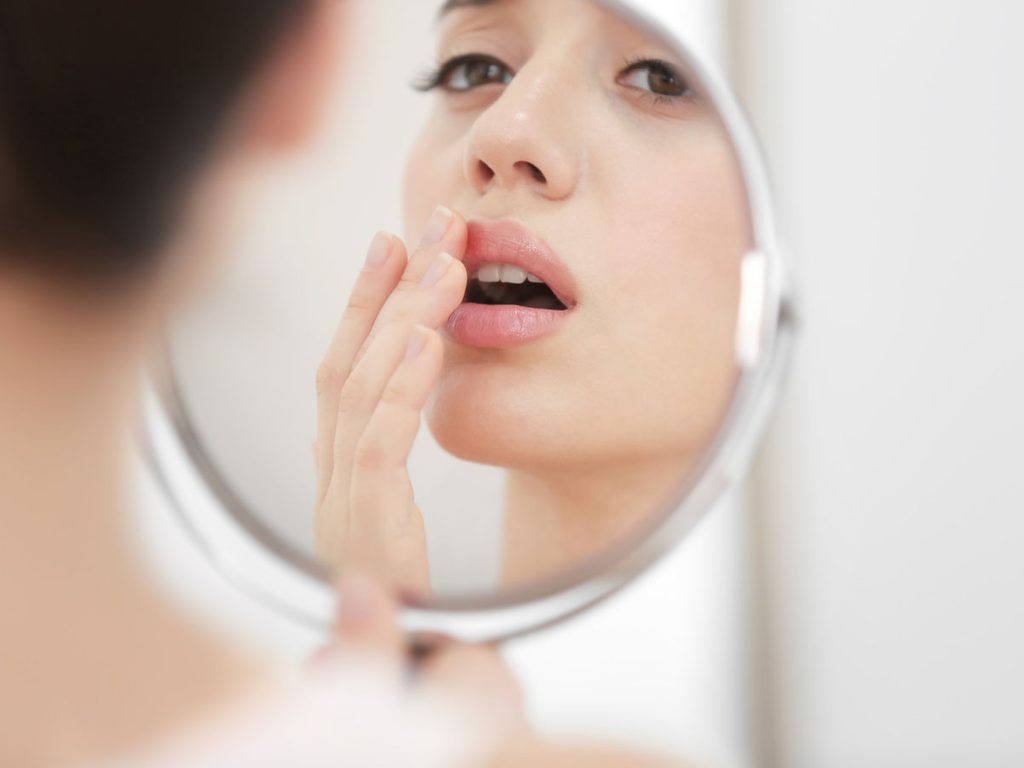How to Stop Canker Sore Pain

If you're looking for remedies to stop the annoying ache of canker sores, these study-tested remedies might do the trick.
That little crater in your mouth causes more pain than anything so small deserves to. Rest assured that in a week or two, your canker sore will most likely be history, and you can chomp a chip, drink a cup of joe, or smooch your spouse without regretting it.
What is a canker sore?
It’s a somewhat mysterious condition known medically as recurrent aphthous ulcers, says Craig Zunka, DDS, a dentist in Front Royal, Virginia. The sores typically appear inside the lips or cheeks, around the gums, or on the tongue. They are white or yellowish, with a halo of red, ranging from the size of a pinhead to the dimensions of a quarter. Experts aren’t sure what causes canker sores, but an immune-system malfunction is thought to play a role. A stressful episode or a mouth injury often precedes a breakout. Recurrent sores can also be brought on by eating certain foods if you have sensitivities, such as chocolate, strawberries. eggs. cheese and spicy or acidic foods. Toothpastes containing sodium laurel sulfate may cause them in some people, as well.
When you should call a doctor
If the pain is too distracting or it’s keeping you from eating or drinking, call your dentist. Definitely call the dentist if you have more than four sores at a time or if the sores last longer than two weeks. Also, if you find that you’re getting canker sores frequently, tell your dentist at your next visit so he or she can recommend evaluation and treatment, such as an antibiotic mouth rinse, a steroid ointment, a prescription oral paste, or chemical cautery of the sores.
How to get rid of canker sores
Seal the sore
Over-the-counter products such as Zilactin-B Canker Sore Gel and Colgate Orabase Soothe-N-Seal can speed healing and provide fast pain relief, according to Mayo Clinic.
A form of licorice known as deglycyrrhizinated licorice, or DGL, also helps with canker sores, according to a study published in the journal Phytotherapy Research.
The sap of aloe vera—the ubiquitous “first aid plant”—can bring welcome relief, a study published in Dental Research Journal found. The study authors used a 2 percent gel.
Put it in neutral
Use a small amount of milk of magnesia as a mouth rinse, or apply it to the canker sore three to four times a day to help healing, according to the Mayo Clinic.
Get that numb feeling
Dab on a topical anesthetic such as Anbesol or Orajel, or let a pain-relieving lozenge, such as Chloraseptic, dissolve in your mouth, suggests the American Academy of Family Physicians. (Have a metallic taste in your mouth? Find out if it’s linked to these health conditions.)
Battle bacteria
Dissolving salt or baking soda into water and rinsing your mouth can aid in healing, according to the Mayo Clinic. Plus, try to eat yogurt that contains live acidophilus cultures (check the label). Acidophilus has been shown to speed up canker sore healing.
Take extra measures
Nutritional deficiencies may play a role in the development of canker sores. Consider taking folate (folic acid), vitamin B-6, vitamin B-12 or lysine to help reduce the occurrence of canker sores and speed healing, say the experts at the Mayo Clinic. Zinc may help mouth injuries like canker sores heal faster, according to a study in the journal Pharmanest. As soon as you detect a sore developing, take 30 milligrams of zinc lozenges each day until it’s gone.
Medically reviewed by Susanne Jackson, DDS.
Now that you’ve learned how to get rid of canker sores, next discover the old-time home remedies your grandmother grew up with.




